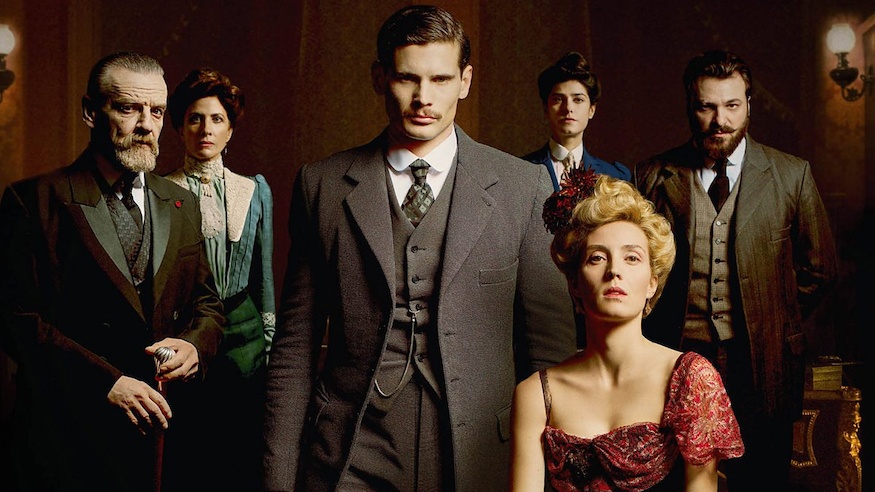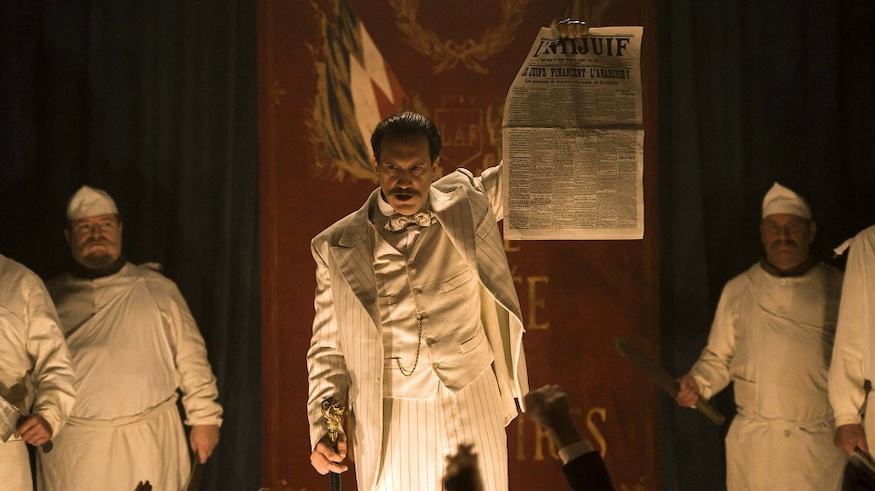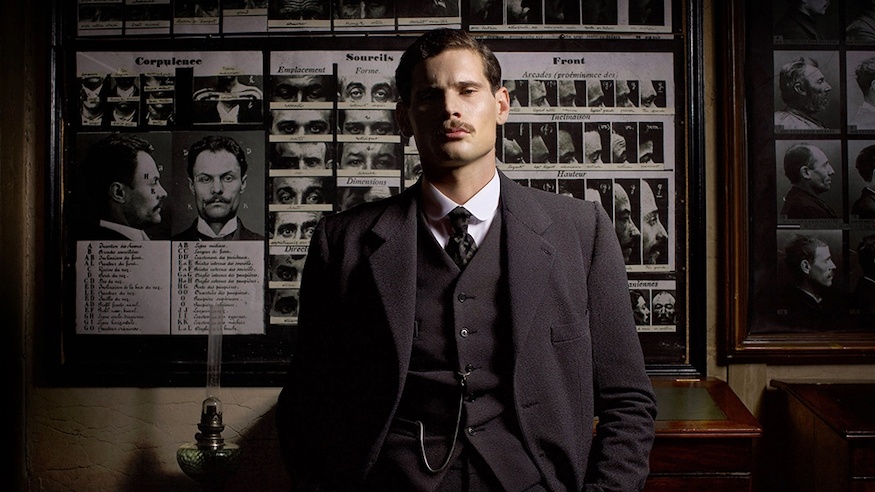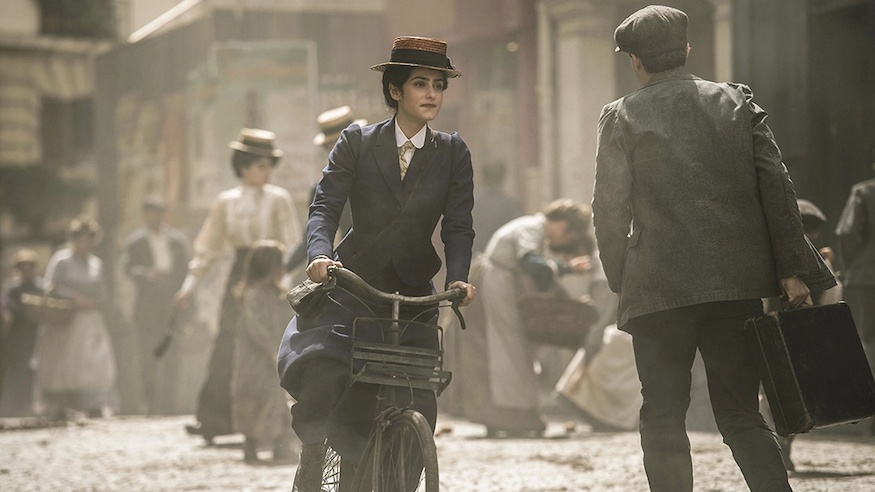
For anyone who loves historical crime fiction, Paris Police 1900 is a sensory treat with an intriguing and often terrifying story at its heart. Airing through October 2021 on Saturday evenings on BBC Four, it’s packed with period accuracy, political finagling, brutal violence, mystery and – yes – plenty of French eccentricity. From well to do ladies injecting heroin while listening to Chopin, through to anarchists disrupting antisemite rallies and on to a demon-summoning séance, Paris Police will have you glued to the screen. You might even be tempted to binge it on iPlayer.
Update: Paris Police 1900 is no longer available on iPlayer but can be streamed on Amazon Prime.
Episode one begins in 1899 with the death of the president of the republic, Félix Faure. He dies of heart failure while receiving a sexual favour from his mistress, Marguerite ‘Meg’ Steinheil (Evelyn Brochu) – both are real life historical figures. Meg is subsequently recruited as an informer by Puybaraud (Patrick D’Assumçao) and Fiersi (Thibaut Evrard) who are officially policemen but unofficially carry out black ops for the French state, ungoverned by the police hierarchy. They’re wary of any secrets Meg may have getting to the press, and also recognise her talents for deception.
Then there’s the lowly police detective Antoine Jouin, the central character of the show, played by Jérémie Lahuerta. Unlike his jaded colleagues, he’s passionate about justice but sees corruption and exploitation all around him. Things go wrong when he tries to help a woman called Hélène Chagnole, whose abusive husband, 30 years her senior, is trying to have her imprisoned for adultery. Monsieur Chagnolle is a low-ranking civil servant but is politically affiliated with the Antisemitic League – another crucial force in the story.

The League is whipping up hatred against Jews across France at a particularly trying point in the country’s history. Alfred Dreyfus, a French Jewish army officer, is about to be retried for treason. The Guérin family – Louis, Jules and their Maman – run abattoirs and butcheries on an industrial scale across Paris and are the leaders of the Antisemitic League. Their anti-Jewish propaganda, intimidation of the public and media war against the police are destabilising the city. So Puybaraud and Fiersi send Meg to spy on them.
The police service itself is about to be shaken up by former colonial official Louis Lépine (Marc Barbé), another real historical figure who is key in the story. He is returning as police commissioner to try and calm things down in Paris as the Dreyfus trial looms and rival political groups mass on the streets. A coup d’état is brewing – there are even hints at restoring the monarchy in Franc. As hard-nosed and cynical as he must be to run the police, at home Lépine is struggling to support his wife (Valérie Dashwood), whose drug addiction could weaken his position.

With all of this going on around him, Jouin is assigned to help solve a curious case – literally. Because a suitcase has been retrieved from la Seine containing the torso of a woman. Trying to find out who the woman is and who killed her puts him on course to clash with the meddling secret police, Puybaraud and Fiersi. The latter of the two is a fascinating character, perhaps the dark horse of the story. You’ll see him beat a man nearly to death, then go home and sit his daughter on his knee, cracking his bruised knuckles. There’s a sense that the dark void in his heart is starting to bother him…
Paris Police 1900 is a visual treat. Early art deco furnishings and décor abound, beautiful vistas of 19th Century Paris in all its pomp are juxtaposed with grubby tenements. It’s easy to see why the political situation is cranking up when there’s so much poverty alongside the decadence la belle époque, making it reminiscent of an earlier period in France’s history… And there are parallels with today as well. Issues we still face, such as antisemitism, sexism, fake news and police and political corruption, tear through this story harshly and blatantly. Plus ça change… They are direct contributors to the murders that take place, and the suffering of the characters.
Paris Police 1900 consists of eight hour-long episodes, and was created by writer-director Fabien Nury, who wrote The Death of Stalin. It was broadcast in France by Canal+ earlier in 2021. It will be surprising if it isn’t nominated for some awards, and it would be great to see this story adapted as a novel or graphic novel.
If you loved Babylon Berlin, set just two decades later, mark Paris Police 1900 down as one to watch. There are times when the story moves along a bit too quickly, and one or two things don’t quite make sense, but the atmosphere and drama are present and correct. Watch for a fine performance by Eugénie Derouand asJeanne Chauvin the young lawyer who can’t practice because of her gender, whom Jouin falls in love with. Crime fiction at its most entertaining, but not for the faint hearted.
If you’ve watched it, please tell us what you think by commenting below. (There are some spoilers in the comments, so beware.)










I think it is a beautiful movie with well played characters and telling the truth about the reality of the Paris life in 1900. The reality is the corruption everywhere and everywhere the poor is paying the bill with his life.
It’s true, and a lot of the characters just accept it…
What is the incest story line, and the revolting photograph could, nt make a lot of it out.
An enthralling story , well acted, wonderful scenery and interiors, that show Parisian elegance and taste , contrasting with the grubby areas and characters of the city. Unmissable drama.
I am bereft that I missed early episodes. The storytelling and historical placement, evocation of Paris fin de siècle luxe, its demimonde, the interstratum viciousness, addictive amorality and circular betrayals, stuns.
Watch it for the wily resourcefulness of women characters, the brio of the men and what it costs them too to survive. If.
Most of all, watch it for the magnificent embroidery on antique leg-of-mutton blouses. Jesus sat on a rock. And he wept.
can catch up on SBS on demand. it’s an Australian free-to-air TV channel.
I am loving this dense crime serial. Trying to understand some french but it isn’t easy. I too found it confusing at times but the the simple plot line here has really helped, I think I will be ok now (episode ;. 3) It is a fascinating slice of history, well acted, written and produced. Yes an award winner. Thank
Just finished final episode. Phew! Magnificent series. (Well, “Death of Stalin”: no surprise, then.) Artistic and commercial stupidity not to have sequal/s,
I’ve just watched the final episode. Could someone please explain the baffling plot? Who did Fiersi kill outside Weidmann’s office? Did Gabriel de Sabran survive or not? Who murdered Josephine and cut her up? I can understand French well enough, but not the plot!
Fiersi killed Gabriel, on the bidding of his boss Puybaraud. I’m not sure why, though. There were loads of not-very-well-explained things in this series. Gabriel killed Josephine, I think by accident when he hit her after she told him that she was blackmailing his Dad (I think). But why did he cut her up? Also the emnity between Gabriel and his Dad wasn’t explained, or if it was, I totally missed it. I either totally missed a lot of things in this series, or else it actually did not really make complete sense.
I found this a great story, but pock- marked with unrelieved and often gratuitous ugliness.
I thought it was an excellent series I had no trouble following the plot excellent actors all well cast for their roles. The scenery was very authentic looking
Gabriel killed Josephine when she revealed she was his half-sister. Fiersi killed Gabriel firstly because he felt guilt at the way Josephine had been treated but also at the behest of Puybaraud because he was working for Gabriel’s Father. His Father had discovered that Gabriel had betrayed his plan to the army to overthrow the government. Although Gabriel killed Josephine it was the assasin who cleared up the crime scene and cut up Josephine’s body, putting her torso in a suitcase and throwing it in the Seine.
Loved this like a lot of people a little bit baffled at times. Beautifully acted and very visually pleasing. Had not realised there was so much hatred towards Jews in Paris- a real eye opener. A great watch even though a bit gory at times
There has to be a sequel as I did my research, and realised Meg Steinheil was also in real life accused of killing both her own husband and I think her own mother…This is one of the best researched and produced dramas I have seen for many years.It was chilling and terrifying but I fear that some people might enjoy it for the wrong reasons.I was gripped by it.A tour de force!
Very good but all the men looked the same with the same moustache and likewise the women. Who why or what happened remains a French mystery. But is there an explanation about why there was such widespread hostility to Jews.? What had they done or not done to explain all this.
This was happening in the background: https://en.wikipedia.org/wiki/Dreyfus_affair
Loved this well acted beautifully filmed drama. Multiple plot lines with backstabbing and intrigue throughout. I did follow the plot but I agree it did require a degree of concentration.
Just watched the last two episodes. Dark. Violent. But brilliant.
Early on I had difficult distinguishing some of the characters. The plotlines were obscure. But for the most part, the goodies won out and the baddies didn’t. I suspect a binge watch twice over might help me sort everything out, but… life is short… Antoine J. and Jeanne C. make a sweet couple.
Your review was spot-on. I was trying to improve my French as I watched. If I was tortured into finally confessing to something I didn’t always like about it – it would be this: there were a few too many cinematic wide shots (usually in an attempt to use doorways to frame shots). The fin de siècle drug abuse was very atmospheric.
Having lived in Paris for 5 years and watching endless tv series in French I have concluded that modern Parisian French is a challenge and that goes for Bureau des Legendes, Spiral, Marseille, Braquo etc. Paris Police 1900 starts rather slowly and is confusing but after the middle becomes a must watch. Like all the above series there’s no humour though.
The attention to detail marks this series out alongside the wonderful Spiral. The lengths that Puybaraud went to in order to “get someting” on his nemesis Lepine, and the surreal but somehow beautiful scene of the 3 ladies injecting the (I think opium at that stage) into their legs, then drifting off to the strains of Chopin – that will live with me a long time. In fact the one lasting impression is just how clever, cunning and underhand the women of the day had to be just to survive, let alone actually prosper.
BTW, the end credits explain that all attempts to convict any of the main corrupt characters not unexpectedly, failed miserably. Great for us for new series, not so great for their victims. Brilliant 10/10 – watch it !!!
There isn’t one element of this drama that disappoints. I particularly enjoyed the small touches of humour (e.g the impersonation of a braying horse aimed at Jouin after he had despatched a horse, Bertillon’s inspection of a suspects pubic hair etc) which reveal a side of the French character not normally acknowledged. Also the contrast of behaviours from Fiersi – displaying a murderous character one moment and then the gentleness of a father with his own family. Best drama I’ve seen in many years (and Paris Police 1905 doesn’t disappoint either).